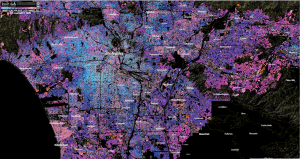June 7, 2015
Briefly
- “Bad things happen to innocent numbers in the news for several reasons. One is the craft norm that it’s OK — even expected — to be bad with numbers. Another is that news stories are. well, stories: they put information into narrative contexts that make sense.” From editing blog headsup
- From the Atlantic (via @beck_eleven) : Should Journalists Know How Many People Read Their Stories? From Scientific American, The Secret to Online Success: What Makes Content Go Viral. The answer given is ’emotion’, but if you look at their research paper, the ‘controls’ such as position on the page, length, and type of content have a much bigger influence.
- From Felix Salmon at Fusion “The way Uber fares are calculated is a mess”
- Mapping Los Angeles’ sprawl: story from Wired about the Built:LA interactive map of age of buildings in LA County. Light blue shows the early 20th century city, with dark purple post-WWII shading to pink and orange for recent consturction

- From Medium, a piece on how internet data gathering and advertising can control your world. If this really worked, you’d think online advertising would be much more lucrative than it seems to be.
Thomas Lumley (@tslumley) is Professor of Biostatistics at the University of Auckland. His research interests include semiparametric models, survey sampling, statistical computing, foundations of statistics, and whatever methodological problems his medical collaborators come up with. He also blogs at Biased and Inefficient See all posts by Thomas Lumley »